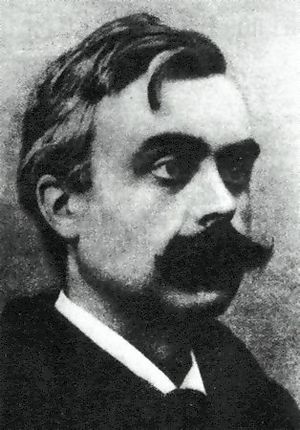Léon Bloy facts for kids
Quick facts for kids
Léon Bloy
|
|
|---|---|

Bloy in 1887
|
|
| Born | 11 July 1846 Notre-Dame-de-Sanilhac, Kingdom of France |
| Died | 3 November 1917 (aged 71) Bourg-la-Reine, French Republic |
| Occupation |
|
| Signature | |
 |
|
Léon Bloy (born July 11, 1846 – died November 3, 1917) was a French writer. He wrote novels, essays, and poems. Bloy was known for strongly defending Catholicism. He had a big impact on Catholic thinkers in France.
Contents
About Léon Bloy's Life Story
Léon Bloy was born on July 11, 1846, in a town called Notre-Dame-de-Sanilhac, France. His father was a freethinker, which means he believed people should form their own opinions, not just follow traditions. His mother was a very religious Catholic.
Bloy had a difficult childhood. He didn't believe in God at first. In 1864, he moved to Paris. In 1868, he met an older Catholic writer named Barbey d'Aurevilly. This meeting changed Bloy's life. Soon after, he became a strong believer in Catholicism.
Bloy's Friends and Strong Opinions
Bloy became friends with other famous people. These included the writer Joris-Karl Huysmans and the painter Georges Rouault. He also knew the philosophers Jacques and Raïssa Maritain. Bloy helped these thinkers become more interested in Catholicism.
However, Bloy was also known for having very strong opinions. He often disagreed with people who thought differently from him. For example, his first novel, Le Désespéré, was a fierce attack on ideas he didn't like. This caused him to lose friends and make enemies among other writers. Famous authors like Émile Zola and Guy de Maupassant became his opponents.
Bloy wrote many letters to important people. He passed away on November 3, 1917, in Bourg-la-Reine.
How Léon Bloy Influenced Others
Léon Bloy's writings had a lasting impact on many people.
Influence on Famous Writers
The famous British writer Graham Greene used a quote from Bloy in his novel The End of the Affair. The Argentine writer Jorge Luis Borges also admired Bloy. Borges even listed Bloy as one of the writers he reread often. Bloy is also quoted in John Irving's novel A Prayer for Owen Meany.
Impact on the Catholic Church
Bloy's book Le Salut par les Juifs (meaning "Salvation through the Jews") was very important. It helped change how the Catholic Church viewed Judaism. His ideas influenced the Second Vatican Council. This was a major meeting that updated many Church teachings.
In 2013, Pope Francis quoted Bloy during his first speech as Pope. He said, "He who does not pray to the Lord prays to the devil." This showed how Bloy's words still resonate today.
Bloy's ideas also appear in modern books. For example, the French novel Submission by Michel Houellebecq talks about Bloy's effect on scholars.
Léon Bloy's Published Works
Bloy wrote many different kinds of books. Here are some of his most well-known works.
Novels
- Le Désespéré (1887) (The Desperate Man)
- La Femme pauvre (1897) (The Woman Who Was Poor)
Essays
- "Le Révélateur du Globe: Christophe Colomb & Sa Béatification Future" (1884) ("The Revealer of the Globe: Christopher Columbus and His Future Beatification")
- "Propos d'un entrepreneur de démolitions" (1884) ("Words of a Demolitions Contractor")
- "Le Salut par les Juifs" (1892) ("Salvation through the Jews")
- "Je m'accuse" (1900) ("I accuse myself"), written as a response to Émile Zola's famous letter J'Accuse…!
- "L'Ame de Napoléon" (1912) ("The Soul of Napoleon")
- "Jeanne d'Arc et l'Allemagne" (1915) ("Joan of Arc and Germany")
Short Stories
- Sueur de sang (1893) ("Sweating blood")
- Histoires désobligeantes (1894) (Disagreeable tales)
Diaries
Bloy also kept detailed diaries throughout his life.
- Le Mendiant ingrat (1898) ("The Ungrateful Beggar")
- Mon Journal (1904) ("My diary")
- Le Pèlerin de l'Absolu (1914) ("The Pilgrim of the Absolute")
Famous Quotes by Léon Bloy
Here are some of Léon Bloy's well-known sayings:
- "Love does not make you weak, because it is the source of all strength, but it makes you see the nothingness of the illusory strength on which you depended before you knew it."
- "There is only one tragedy in the end, not to have been a saint."
- "But I love Paris, which is the place of intelligence, and I feel Paris threatened by this truly tragic lampstand sprouting from its belly, which will be visible at night from twenty leagues away ..."
Images for kids
See also
 In Spanish: Léon Bloy para niños
In Spanish: Léon Bloy para niños


